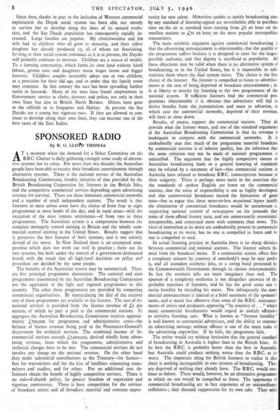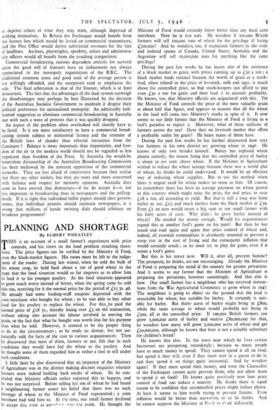SPONSORED RADIO
By R. G. LLO'fD THOMAS
AT a moment when the demand foi 'a Select Committee on th-e B.B.C. Charter is daily gathering strength some study of alterna- tive systems has its value. For more than two decades the Australian people have been able to receive their broadcast entertainment through alternative systems. There is the national service of the Australian Broadcasting Commission, frankly imitative of that provided by the British Broadcasting Corporation for listeners in the British Isles, and the competitive commercial services depending upon advertising revenue for survival. There are three dominant commercial networks and a number of small independent stations. The result is that listeners in most urban areas have the choice of from four to eight programmes at most houYs of the day, and in rural areas—with the exception of the most remote settlements—of from two to three programmes. The Australian system is a compromise between .the complete monopoly control existing in Britain and the wholly com- mercial control existing in the United States. Results suggest that it preserves the best features of both systems, and is not entirely devoid of the worst. In New Zealand there is an attempted com- promise which does not work out well in practice ; there are the two systems, but both under the control of a government-dominated board, with the result that all high-level decisions on policy and procedure are decided by the same people.
The benefits of the Australian system may be summarised. There are five principal programme alternatives. The national and state programmes transmitted by the Australian Broadcasting Commission are the equivalent of the light and regional programmes in this country. The other three programmes are provided by competing commercial organisations. By manipulating the dial of the. receiver any of these programmes are available to the listener. The cost of the national services is provided from the licence revenue of Li per annum, of which no part is paid to the commercial stations. In aggregate the Australian Broadcasting Commission receives approxi- mately L7oo,000 for programme and administrative costs—the balance of licence revenue being paid to the Postmaster-General's department for technical services. The combined income of the commercial stations exceeds £2,000,000, derived wholly from adver- tising revenue, from which the programme, administrative and technical charges have to be met. The commercial services do not involve any charge on the national revenue. On the other hand they make substantial contributions to the Treasury—for licence— fees for transmitters and for the hire of landlines connecting trans- mitters and studios, and for relays. For no additional cost the listeners obtain the benefit of highly competitive services. There is no rule-of-thumb policy, far greater freedom of expression and vigorous controversy. There is keen competition for the services of broadcast artists and all broadcast material and constant oppor- tunity for new talent. Minorities unable to justify broadcasting time by any standard of listening-appeal are nevertheless able to purchase time on the air at standard rates varying from an hour on the smallest stations to L70 an hour on the most popular metropolitan transmitters.
The main aesthetic argument against commercial broadcasting is that the advertising annouwement is objectionable, that the quality of the programme suffers because it is designed to cater for the largest possible audience, and that dignity is sacrificed to popularity. All these objections may be valid when there is no alternative system of broadcasting, as in the United States, but it is impossible to sub- stantiate them where the dual system exists. The choice is the free choice of the listener. No listener is compelled to listen to advertise- ments at the cost of being deprived of broadcast entertainment ; he is at liberty to restrict his listening to the two programmes of the national system. If sufficient listeners find the commercial pro- grammes objectionable it is obvious that advertisers will fail to derive benefits from the transmissions and cease to advertise, in which case the commercial networks, deprived of their revenue, will have to close down..,
Results, of course, support the commercial stations. They do provide what the listener wants, and one of the standard•arguments of the Australian Broadcasting Commission is that its revenue is inadequate to compete ,with the commercial networks. It is undoubtedly true that much of the programme material broadcast by commercial stations is of inferior quality, but the inference that the same criticism may not be made of national programmes is unjustified. The argument that the highly competitive nature of Australian broadcasting leads to a general lowering of standards may be refuted by a statement of fact—that commercial stations in Australia have refused to broadcast B.B.C. transcriptions because of their vulgarity. There is perhaps more merit in the assertion that the standards of spoken English are lower on the commercial stations, that the sense of responsibility is not as highly developed, and that controversial broadcasts exceed the limitations of good taste—but to argue that these more-or-less occasional lapses justify the elimination of commercial broadcasts would be tantamount to supporting national control of newspapers on the grounds that some of them offend literary taste, and are unnecessarily sensational, irresponsible, and concerned more with comment than news. The vices of journalism at its worst are undoubtedly present in commercial broadcasting at its worst, but no one is compelled to listen and no one is compelled to read.
In actual listening practice in Australia there is no sharp division between commercial and national stations. The listener selects hh meal from the broadcasrmenu. If a commercial station offers him a symphony concert by courtesy of somebody's soap he may prefer it, and all attendant aesthetic jolts, to a swing band presented by the Commonwealth Government through its chosen instrumentality. In fact the aesthetic jolts are more imaginary than real. The sponsor of a symphony orchestra is not altogether unaware of the probable reactions of listeners, and he has the good sense not to excite hostility by intrciding his wares. Not infrequently the com- mercial announcement is limited to a brief statement of the sponsor's name, and is much less offensive than some of the B.B.C. announce- ments of artists and producers appearing " by courtesy of . . ." which many commercial broadcasters would regard as unduly offensive to sensitive listening ears. What is known as "listener hostility is well known to commercial advertisers, and the ability to transmit an advertising message without offence is one of the main tasks of the advertising copywther. If he fails, the programme fails.
The writer would say without hesitation that the general standard of broadcasting in Australia is higher than in the British Isles. At its best the B.B.C. is probably better than the best in Australia, but Australia could produce nothing worse than the B.B.C. at its worst. The important thing for British listeners to realise is that there is nothing incompatible in two systems of broadcasting. They are deprived of nothing they already have. The B.B.C. would con- tinue as before. There would, however, be an alternative programme to which no one would be compelled to listen. The opponents of commercial broadcastiiig are in fact exponents of an extraordinary selfishness ; they demand suppression for its own sake. They wish to deprive others of what they may want, although deprived of nothing themselves. In Britain the Exchequer would benefit from the licence fees which would be levied on commercial transmitters, and the Post Office would derive substantial revenues for the hire of landlines. Authors, playwrights, speakers, artists and administra- tive officers would all benefit from the resulting competition.
Commercial broadcasting stations dependent entirely for survival upon the good will of listeners have an inducement not always appreciated in the monopoly organisapon of the B.B.C. The traditional common sense and good taste of the average person is not willingly offended, and the exceptions tend to emphasise the rule. The final arbitration is that of the listener, which is at least democratic. The fact that the advantages of the dual system outweigh the disadvantages may perhaps be best Alustrated by the decision of the Australian Socialist Government to maintain it despite their political preference for nationalised monopoly. An admittedly half- hearted suggestion to eliminate commercial broadcasting in Australia met with such a wave of protests that it was quickly dropped.
An aspect of the problem often overlooked will shortly have to be faced. Is it not more -satisfactory to have a commercial broad- casting system subject to ministerial licence and the restraint of the British laws of slander than etherial intrusions from the Continent ? Balance is more important than impartiality, and free- dom of the air in the modern world should not be regarded as less important than freedom of the Press. In Australia the would-be benevolent dictatorship of the Australian Broadcasting Commission has been mellowed by the constant opposition of the commercial networks. They are less afraid of controversy because they realise that there are other outlets, but they are more and more concerned with balance and respect for minority opinions. Australia does seem to have proved that democracy—if we do accept it—is not less important in broadcasting than in newspapers and the polling- booth. If it is right that individual ballot pdpers should elect govern- ments, that individual pennies should maintain newspapers, is A wrong that millions of hands twisting dials should arbitrate on broadcast programmes?



























 Previous page
Previous page